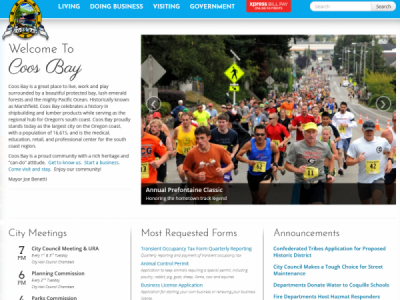
Posted on March 25, 2019
On Thursday night the Coos Bay Planning Commission decided to continue its discussion as to whether or not it will recommend an application by Jordan Cove to dredge a section of the bay.
People who would like submit comment for or against the dredging recommendation can do so in writing until April 25. After April 25, a secondary comment period after first round comments are reviewed and potential changes are made to the application ends May 16. Finally the Coos Bay Planning Commission will reconvene to make a decision on whether or not to recommend the dredging application on June 6.
There are four areas along the Coos Bay shipping channel that the Jordan Cove Energy Project has proposed be dredged. Only one of those dredging proposals falls under the city of Coos Bay’s jurisdiction. The other three must be approved by the county to move forward.
The city of Coos Bay reached out to the Lane Council of Governments to help them provide a staff report for the planning commission to review. LCOG’s report found the application for dredging to be acceptable provided the applicant meet around a dozen or so conditions.
“The proposal is to make a change from what is currently natural aquatic management units to development aquatic management units,” Jake Callister with LCOG said.
Many of LCOG’s conditions for approval were things like the Jordan Cove Energy Project acquiring all state and federal permits necessary to begin the dredging projects, all of which they are in the process of obtaining. Other conditions, for example, were to provide the city with a spill prevention response plan.
After the staff report, land use lawyer Steve Pfeifer spoke on behalf of the applicant Jordan Cove LNG.
“This application is simply an attempt to improve the efficiency of the channel to accommodate vessels which would otherwise have to hang off shore during weather conditions, and eliminate that delay by improving the ability to navigate through these four corners,” Pfeifer said.
The public comment period of the meeting saw around 20 people who spoke against the need for dredging in the bay, and two people who spoke in favor of dredging.
“Historically this has been a problem turn for us,” harbor pilot George Whales said. “It’s a sharp turn in an area of the flats that silts in…For us this would be a boom. It would open that turn up so that there’s an increase in the radius of the turn that makes it so ship doesn’t transfer in the turn so much.”
Aside from Whales, a representative of Roseburg Forest Products spoke in favor of dredging the channel, because it would allow for them to do business with larger ships.
Those who spoke against the dredging called into question things like how the channel widening will affect local herring spawning areas, as well as eelgrass. Many of the folks who spoke against the dredging project felt that it was simply unnecessarily harmful to the surrounding area.
“These bays are high performance ecosystems,” former South Slough manager Mike Graybill said. “The winter time, which is when this proposed dredging widow is identified, is peak water fowl usage…The application uses dated material to talk about the duration and intensity of the impacts.”
Local conservation group Surfrider was present at the meeting to speak out against the dredging project.
While staying neutral to the overall Jordan Cove LNG project, the Confederated Tribes of Coos, Lower Umpqua, and Siuslaw Indians did send a legal representative to question the necessity of dredging the bay and widening the channel.
“There needs to be a public need under Policy 5. I would point to the record that there is a letter from May 2018, from the Coast Guard that indicates that the waterway in its current state is considered suitable for LNG marine traffic associated with the project,” legal advisor for CTCLUSI Rick Eichstaedt said. “In other words the Coast Guard is saying it’s fine how it is.
However, Pfeifer argued in his response to the public comment period that Policy 5 was not a relevant to the application.
Source: theworldlink.com





